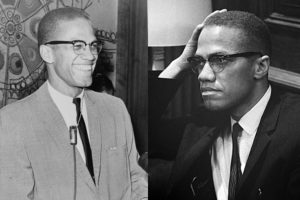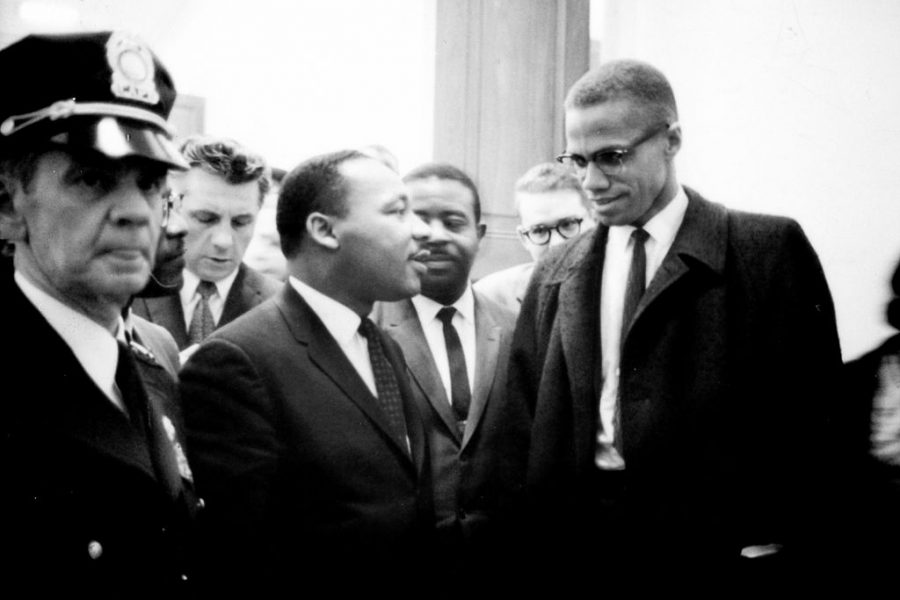Black History Month: Malcolm X changed the norms for Americans
IMAGE / Marion S. Trikosko / Wikimedia Commons
Malcom X (right) and the rev. Dr. Martin Luther King, Jr. (center) meet before a press conference. Both men had come to hear the Senate debate on the Civil Rights Act of 1964. This was the only time the two men ever met. Their meeting lasted only one minute.
Changing societal norms was rare in the 1900s due to the consequences that came with each change in American culture.
During these times, people were killed or tortured for expressing beliefs.
For example, the Rev. Dr. Martin Luther King Jr. was killed for leading protests against discrimination.
But that didn’t stop Malcolm Little from challenging mainstream rights and the non-violent approach King advocated.
But it wasn’t always like this.
Growing up, Little’s childhood was rough.
On May 19, 1935, Little was born in Omaha, Neb.
Life seemed simple until the Ku Klux Klan made threats against Little’s father, the Rev. Earl Little.
Malcolm’s father was known for preaching to his followers to take control of their lives.
Because of this, the Little family moved north to Lansing, Mich., but even there, they faced threats.

Malcolm X was known to bring pride to the black community. One way he did this was by teaching self-defense from whites.
Malcolm’s father died on Sept. 28, 1931.
Allegedly he was run over by a streetcar in Lansing by the Black Legion, a known racist group located in Michigan.
This was a tragic moment for Malcolm, showing how blacks were treated in the 1930s.
Sadly, the death of his father drove his mother, Mrs. Louise Little, to insanity.
Malcolm was sent to foster homes when he was just 6 years old.
At age 21, Malcolm went to prison for burglary to serve a six-year sentence.
During his time behind bars, he met Elijah Muhammad, leader of the Nation of Islam (Black Muslims).
He joined the group and adopted the name Malcolm X.
After his release, Little helped lead the Nation of Islam and became a minister of Boston Temple Nos. 7 and 11.
Mr. Ed Councilor, history teacher, disagrees with Little’s method to end racism.
“His approach wasn’t effective. He alienated himself and his followers from whites, unlike King,” Councilor said.
In December 1963, the Black Muslims suspended Malcolm X. He took this time to travel to Mecca, Islam’s holiest city, which is in Saudi Arabia, to discover the preaching of equality within the races.
He abandoned his ideal of hating whites to make an organization of Afro-American Unity in June 1964.
The organization became popular to the point where big groups like the Student Non-Violent Coordinating Committee were supporting it.
He also believed in pan-Africanism, a worldwide movement that encourages unity between all people of African descent, black self-determination, and self-defense.
Councilor said Malcolm X gave blacks something to live for.
“(Malcolm X) gave black people pride in their culture and in their heritage,” Councilor said.
His organization grew bigger than the Black Muslims, who fired hatred at Malcolm X.
This hatred led Little to his grave on Feb. 21, 1965, when a Black Muslim member who was at his rally killed him.
Sophomore Kyhra Starr disagrees with Malcolm X’s approach to discrimination, believing violence is not the answer.
“I think his approach was not the greatest,” Starr said. “King’s approach of non-violence to me made a better message.”
Starr said that the past is important when shaping the present.
“I think you have to use the past to fix the present,” Starr said. “If you look to the past, you can avoid making the same mistakes as the people in the past. Then if you don’t make those same decisions, history won’t repeat itself.”

Class: Junior
Hobbies: Reading, writing, and hanging out with friends and family.
Future Plans: After high school, I plan to attend community...











